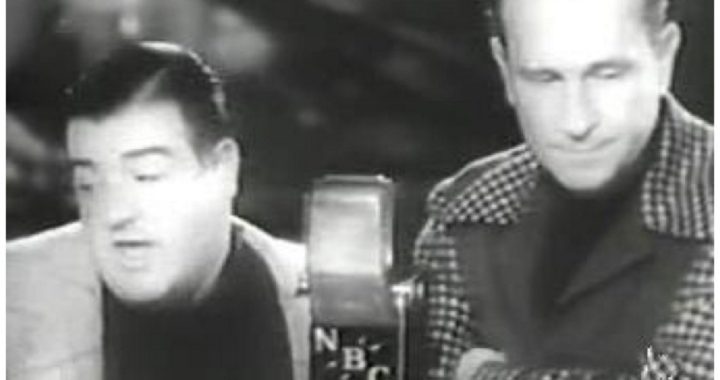
Fighting the vicious killers of the so-called Islamic State in Iraq and the Levant (ISIL), also known as ISIS, is no joking matter, but President Obama’s plan to arm and train “moderate” rebels in Syria might leave some members of Congress feeling a bit like Lou Costello (shown on left) trying to make sense of Bud Abbott’s (shown on right) description of a certain fictitious (and suspicious) baseball team.
“Now we have Who’s on first, What’s on second, I dunno’s on third…”
It’s pretty hard, after all, for members of Congress or even Middle East experts in the State Department to separate the moderates from the extremists, as both have been fighting against the government forces of Syrian ruler Bashar al-Assad in the Syrian Civil War.
There isn’t a formal definition of a Syrian moderate, Leila Hilal of the New America Foundation told the National Journal. But implicit in the word, she said, are a few criteria: a Syrian who is a nationalist and is fighting for a secular, democratic, and inclusive state. But determining who fits that description is the tricky part. The Syrian National Coalition could have used its Supreme Military Council to help determine who is a moderate, Hilal said, but that group has been disbanded. Or perhaps it’s been dispatched to another world, offering further evidence that the life of moderates in Syria is “nasty, brutish and short.”
“One of the problems is that whether or not someone is fighting under an Islamic banner or a Syrian revolutionary flag, they’re often working together on different fronts,” said Hilal, a senior fellow with New America’s International Security Program. “If they’re fighting to take over the military base or airport … different groups ideologically predisposed will be fighting together.”
Surely, nothing unites warring factions like a common enemy, which explains why so many radical groups in the Middle East have one thing in common: hatred of America. Back in the days of the Iran-Contra scandal, the Reagan administration delivered arms to what officials believed (or at least hoped) were the more “moderate” factions in Iran. An editorial cartoon at the time depicted two Iranians carrying placards. The one on the left held a sign proclaiming, “Death to America.” The other held a sign saying, “Serious Injury to America.” In the background National Security Advisor Bud McFarland was advising Reagan: “I think the one on the right is the moderate.”
According to Secretary of State John Kerry, even the left-wing antiwar group Code Pink should be supporting President Obama’s campaign to “degrade and ultimately destroy” the Islamic State. Members of Code Pink interrupted Kerry’s testimony to the Senate Foreign Relations Committee Wednesday, chanting antiwar slogans and holding on placards that said, “DON’T TAKE THE ISIL WAR BAIT,” “THERE IS NO MILITARY SOLUTION,” and ‘NO BEHEADING NO BOMBING.” As order was restored and the demonstrators ejected, Kerry had some words to say about the protesters.
“I respect the right of Code Pink to protest and to use that right,” the secretary said. “Code Pink was started by a woman and women who were opposed to war, but who also thought the government’s job was to take care of people and to give them healthcare and education and good jobs,” he said. “And if that’s what you believe in, and I believe it is, then you ought to care about fighting ISIL because ISIL is killing and raping and mutilating women and they believe women shouldn’t have an education.” Kerry added that the terrorist group is “not offering education of any kind.” In recent days it has curtailed art and music classes and had “permanently annulled” classes about history and Christianity.
The campaign against ISIL has barely begun and already the sound of “mission creep” is loud and unmistakable. Whether or not we agree with Obama’s plan for dealing with ISIL, most Americans no doubt appreciate the motive of fighting ISIL for national security reasons, however vague and undefined, or even to avenge the beheading of two American journalists. But despite the president’s pledge that no ground troops are to be sent back to Iraq, Kerry’s comments raise some important questions. Are American pilots to brave anti-aircraft fire and U.S. military “advisors” on the ground to be in harm’s way in order to make Iraq and Syria safe for art and music classes and education free of gender bias? Will the United States be fighting to export the blessings of the U.S. Department of Education, the No Child Left Behind Act and Common Core? Will American policymakers not be happy until Iraq and Syria have governments whose job it is to “take care of people and to give them healthcare and education and good jobs”? Kerry, who fought in Vietnam and later protested against the U.S. war there, ought to recognize in his own rhetoric President Lyndon Johnson’s vision of a Great Society on the Mekong Delta.
As House Appropriations Chairman Harold Rogers (R-Ky.) said last week: “They use the term ‘moderates.’ I don’t know a moderate person in Syria…. We’ve seen arms that we supplied in Iraq and Afghanistan, American arms, now in the hands of fighters in Syria.”
So who really is in charge of American Middle East policy? It can’t be Abbot and Costello. They’re still dead.
Aren’t they?



